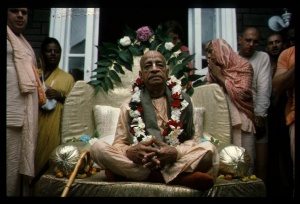SB 4.14.4: Difference between revisions
m (1 revision(s)) |
(Vanibot #0054 edit - transform synonyms into clickable links, which search similar occurrences) |
||
| (One intermediate revision by one other user not shown) | |||
| Line 1: | Line 1: | ||
{{info | {{info | ||
|speaker=Maitreya | |speaker=Maitreya Ṛṣi | ||
|listener=Vidura | |listener=Vidura | ||
}} | }} | ||
[[Category:Srimad-Bhagavatam - Canto 04 Chapter 14|S04]] | |||
[[Category:Bhagavatam Verses Spoken by Maitreya Rsi - Vanisource|041404]] | |||
<div style="float:left">'''[[Srimad-Bhagavatam]] - [[SB 4|Fourth Canto]] - [[SB 4.14: The Story of King Vena|Chapter 14: The Story of King Vena]]'''</div> | |||
<div style="float:right">[[File:Go-previous.png|link=SB 4.14.3]] '''[[SB 4.14.3]] - [[SB 4.14.5]]''' [[File:Go-next.png|link=SB 4.14.5]]</div> | |||
{{RandomImage}} | |||
==== TEXT 4 ==== | ==== TEXT 4 ==== | ||
<div | <div class="verse"> | ||
sa ārūḍha-nṛpa-sthāna | :sa ārūḍha-nṛpa-sthāna | ||
unnaddho 'ṣṭa-vibhūtibhiḥ | :unnaddho 'ṣṭa-vibhūtibhiḥ | ||
avamene mahā-bhāgān | :avamene mahā-bhāgān | ||
stabdhaḥ sambhāvitaḥ svataḥ | :stabdhaḥ sambhāvitaḥ svataḥ | ||
</div> | </div> | ||
| Line 16: | Line 22: | ||
==== SYNONYMS ==== | ==== SYNONYMS ==== | ||
<div | <div class="synonyms"> | ||
''[//vanipedia.org/wiki/Special:VaniSearch?s=saḥ&tab=syno_o&ds=1 saḥ]'' — King Vena; ''[//vanipedia.org/wiki/Special:VaniSearch?s=ārūḍha&tab=syno_o&ds=1 ārūḍha]'' — ascended to; ''[//vanipedia.org/wiki/Special:VaniSearch?s=nṛpa&tab=syno_o&ds=1 nṛpa]-[//vanipedia.org/wiki/Special:VaniSearch?s=sthānaḥ&tab=syno_o&ds=1 sthānaḥ]'' — the seat of the king; ''[//vanipedia.org/wiki/Special:VaniSearch?s=unnaddhaḥ&tab=syno_o&ds=1 unnaddhaḥ]'' — very proud; ''[//vanipedia.org/wiki/Special:VaniSearch?s=aṣṭa&tab=syno_o&ds=1 aṣṭa]'' — eight; ''[//vanipedia.org/wiki/Special:VaniSearch?s=vibhūtibhiḥ&tab=syno_o&ds=1 vibhūtibhiḥ]'' — by opulences; ''[//vanipedia.org/wiki/Special:VaniSearch?s=avamene&tab=syno_o&ds=1 avamene]'' — began to insult; ''[//vanipedia.org/wiki/Special:VaniSearch?s=mahā&tab=syno_o&ds=1 mahā]-[//vanipedia.org/wiki/Special:VaniSearch?s=bhāgān&tab=syno_o&ds=1 bhāgān]'' — great personalities; ''[//vanipedia.org/wiki/Special:VaniSearch?s=stabdhaḥ&tab=syno_o&ds=1 stabdhaḥ]'' — inconsiderate; ''[//vanipedia.org/wiki/Special:VaniSearch?s=sambhāvitaḥ&tab=syno_o&ds=1 sambhāvitaḥ]'' — considered great; ''[//vanipedia.org/wiki/Special:VaniSearch?s=svataḥ&tab=syno_o&ds=1 svataḥ]'' — by himself. | |||
</div> | </div> | ||
| Line 23: | Line 29: | ||
==== TRANSLATION ==== | ==== TRANSLATION ==== | ||
<div | <div class="translation"> | ||
When the King ascended to the throne, he became all-powerful with eight kinds of opulences. Consequently he became too proud. By virtue of his false prestige, he considered himself to be greater than anyone. Thus he began to insult great personalities. | When the King ascended to the throne, he became all-powerful with eight kinds of opulences. Consequently he became too proud. By virtue of his false prestige, he considered himself to be greater than anyone. Thus he began to insult great personalities. | ||
</div> | </div> | ||
| Line 30: | Line 36: | ||
==== PURPORT ==== | ==== PURPORT ==== | ||
<div | <div class="purport"> | ||
In this verse the word aṣṭa-vibhūtibhiḥ, meaning "by eight opulences," is very important. The king is supposed to possess eight kinds of opulences. By dint of mystic yoga practice, kings generally acquired these eight opulences. These kings were called rājarṣis, kings who were also great sages. By practicing mystic yoga, a rājarṣi could become smaller than the smallest, greater than the greatest, and could get whatever he desired. A rājarṣi could also create a kingdom, bring everyone under his control and rule everyone. These were some of the opulences of a king. King Vena, however, was not practiced in yoga, but he became very proud of his royal position nonetheless. Because he was not very considerate, he began to misuse his power and insult great personalities. | In this verse the word ''aṣṭa-vibhūtibhiḥ'', meaning "by eight opulences," is very important. The king is supposed to possess eight kinds of opulences. By dint of mystic ''yoga'' practice, kings generally acquired these eight opulences. These kings were called ''rājarṣis'', kings who were also great sages. By practicing mystic ''yoga'', a ''rājarṣi'' could become smaller than the smallest, greater than the greatest, and could get whatever he desired. A ''rājarṣi'' could also create a kingdom, bring everyone under his control and rule everyone. These were some of the opulences of a king. King Vena, however, was not practiced in ''yoga'', but he became very proud of his royal position nonetheless. Because he was not very considerate, he began to misuse his power and insult great personalities. | ||
</div> | </div> | ||
__NOTOC__ | |||
<div style="float:right; clear:both;">[[File:Go-previous.png|link=SB 4.14.3]] '''[[SB 4.14.3]] - [[SB 4.14.5]]''' [[File:Go-next.png|link=SB 4.14.5]]</div> | |||
__NOTOC__ | |||
__NOEDITSECTION__ | |||
Latest revision as of 21:24, 18 February 2024

A.C. Bhaktivedanta Swami Prabhupada
TEXT 4
- sa ārūḍha-nṛpa-sthāna
- unnaddho 'ṣṭa-vibhūtibhiḥ
- avamene mahā-bhāgān
- stabdhaḥ sambhāvitaḥ svataḥ
SYNONYMS
saḥ — King Vena; ārūḍha — ascended to; nṛpa-sthānaḥ — the seat of the king; unnaddhaḥ — very proud; aṣṭa — eight; vibhūtibhiḥ — by opulences; avamene — began to insult; mahā-bhāgān — great personalities; stabdhaḥ — inconsiderate; sambhāvitaḥ — considered great; svataḥ — by himself.
TRANSLATION
When the King ascended to the throne, he became all-powerful with eight kinds of opulences. Consequently he became too proud. By virtue of his false prestige, he considered himself to be greater than anyone. Thus he began to insult great personalities.
PURPORT
In this verse the word aṣṭa-vibhūtibhiḥ, meaning "by eight opulences," is very important. The king is supposed to possess eight kinds of opulences. By dint of mystic yoga practice, kings generally acquired these eight opulences. These kings were called rājarṣis, kings who were also great sages. By practicing mystic yoga, a rājarṣi could become smaller than the smallest, greater than the greatest, and could get whatever he desired. A rājarṣi could also create a kingdom, bring everyone under his control and rule everyone. These were some of the opulences of a king. King Vena, however, was not practiced in yoga, but he became very proud of his royal position nonetheless. Because he was not very considerate, he began to misuse his power and insult great personalities.